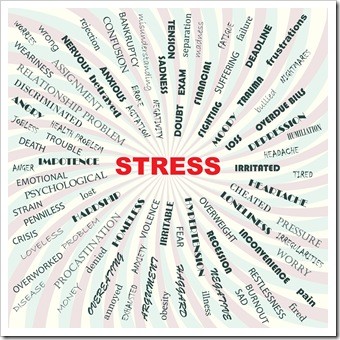STRESS
Stress is simply a fact of human nature. It is a normal, unavoidable part of living.
Stress is something that most people experience on a daily basis. Stress is defined as our reaction to events, environmental or internal, that are associated with substantial adaptive demands that tax or exceed our adaptive resources. Stress results from things that impact upon us in the normal course of life. Stress requires adaptation because it is a force that impairs the individual’s mental balance. The process by which individual’s maintains their equilibrium and therefore their health under varying conditions. Change generates stress by forcing individual’s to make adjustments in their lives, often in a climate of uncertainty and unpredictability. Stress produces a state of imbalance in the individual. Stress reactions consist of both physical and emotional responses.
Internal factors determine your body’s ability to respond to, and deal with, the external stress-inducing factors. Internal factors, which influence your ability to handle stress, include your genetic endowment, nutritional status, overall health and fitness levels, emotional well-being or ego strength, degree of social support network available and the amount of sleep and rest you get. Due to the overabundance of stress in our modern lives, we usually think of stress as a negative experience, but from a psychiatric point of view, stress can be a neutral, negative, or positive experience.
Everyone experiences stress in his or her life from time to time. Any change in life, positive or negative, can cause stress. However, not all stress is negative. When resources are not overly taxed or depleted, resulting stress can be healthy and rather challenging this is referred to as “NORMAL STRESS” or by the more technical term, “EUSTRESS.”
Eustress is stress that enhances function, physical or mental, such as through strength training or challenging work. Eustress results from exhilarating, desired or positive experiences.
The type of stress you are likely to experience when there is job promotion, a move to a new and desired house, the birth of a child, an inheritance of a large amount of money, winning and achieving. Positive stressors can constitute or lead to a problem, as when a person has difficulty adapting to the new situation.
Distress is persistent stress that is not resolved through coping or adaptation and may lead to anxiety and/or depression. Distress can occur when coping resources are overwhelmed or not readily available.
A psychosocial or environmental stress may have a negative effect on our lives. Environmental difficulty or deficiency, family or other interpersonal problems or inadequate social support or personal resources can prompt it. Distress can result from a very traumatic single incident or from the accumulation of multiple stressors over longer periods of time. Distress can be harmful to a person’s well being.
Whether an individual experiences eustress or distress depends on the difference between an experience (real or imagined), personal expectations, and the resources to cope with the stress.
CAUSES OF STRESS
PHYSICAL STRESSORS
Which result from internal and external physical symptoms. Internal physical symptoms include pain, headaches, stomach problem etc.; external physical stressors are things such as heat, cold, excessive noise etc.
PSYCHOLOGICAL STRESSORS
This can arise from the time pressure of unrealistic deadlines or the unrealistic expectations we place on ourselves or allow others to place on us. Sometimes we think, “You must be perfect,” “you’re indispensable to the system” and/or “you must suppress your feelings at all costs.” This type of thinking can lead to distress.
FAMILIAL STRESSORS
This can arise from relationship problems with parent spouses, and children. Family problems can tax important resources like time, and money, and often require immediate attention.
SPIRITUAL STRESSORS
Which arise when basic spiritual values or beliefs are reformulated, called into question, or discarded. A loss of values, of meaning, or change in a person’s relationship with a higher power can contribute to the dissonance, and hence, greater levels of stress.
SOCIAL STRESSORS
Which are abundant and can arise in any context where interpersonal relationships exist, particularly relationships that have terminated, and issues at work, church, and community. Often these stressors are exacerbated by financial requests and excessive time demands.
THINGS THAT INFLUENCE YOUR STRESS TOLERANCE LEVEL
YOUR SUPPORT NETWORK
A strong network of supportive friends and family members is an enormous buffer against life’s stressors. On the flip side, the more lonely and isolated you are, the greater your vulnerability to stress.
YOUR SENSE OF CONTROL
If you have confidence in yourself and your ability to influence events and persevere through challenges, it’s easier to take stress in stride. People who are vulnerable to stress tend to feel like things are out of control.
YOUR ATTITUDE AND OUTLOOK
Stress-hardy people have an optimistic attitude. They tend to embrace challenges, have a strong sense of humor, accept that change is a part of life, and have meaning and purpose in their life.
YOUR ABILITY TO DEAL WITH YOUR EMOTIONS
You’re extremely vulnerable to stress if you don’t know how to calm and soothe yourself when you’re feeling sad, angry, or afraid. The ability to bring your emotions into balance helps you bounce back from adversity.
YOUR KNOWLEDGE AND PREPARATION
The more you know about a stressful situation, including how long it will last and what to expect, the easier it is to cope. For example, if you go into surgery with a realistic picture of what to expect post-op, a painful recovery will be less traumatic than if you were expecting to bounce back immediately.
